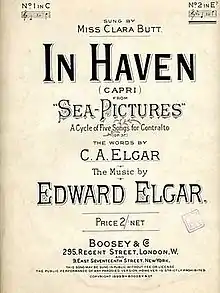In Haven
In Haven (Capri) is a poem by Caroline Alice Elgar, probably best known in its musical setting as the second (and shortest) song composed by her husband Edward Elgar for his song-cycle Sea Pictures.

History
Elgar first set Alice's poem to music for voice and piano in 1897 and it was published in a cultural magazine "The Dome" in 1898, with the title "Love alone will stay". Alice then adapted it for Sea Pictures: she re-ordered the verses, included more allusions to the sea, and it was renamed "In Haven".
Words
"In Haven (Capri)" |
"Love Alone Will Stay" |
Elgar's setting
In the third verse, violins are added to the vocal line. It concludes with an upward scale on the violins and a pizzicato on the lower strings. [3]
Recordings
As well as the recordings listed in the Sea Pictures article, In Haven has been recorded by Robert Meadmore.[4]
References
- Elgar, Edward (1900). Sea Pictures, Op.37. London: Boosey & Co. p. 10.
- "The Dome" (4). London: Unicorn Press. 1898: 90–91. Cite journal requires
|journal=(help) - Beales, Brendan Royal Philharmonic Orchestra Concert Programme for performance at the Royal Albert Hall 6 April 2008
- After A Dream Archived 2007-05-26 at the Wayback Machine